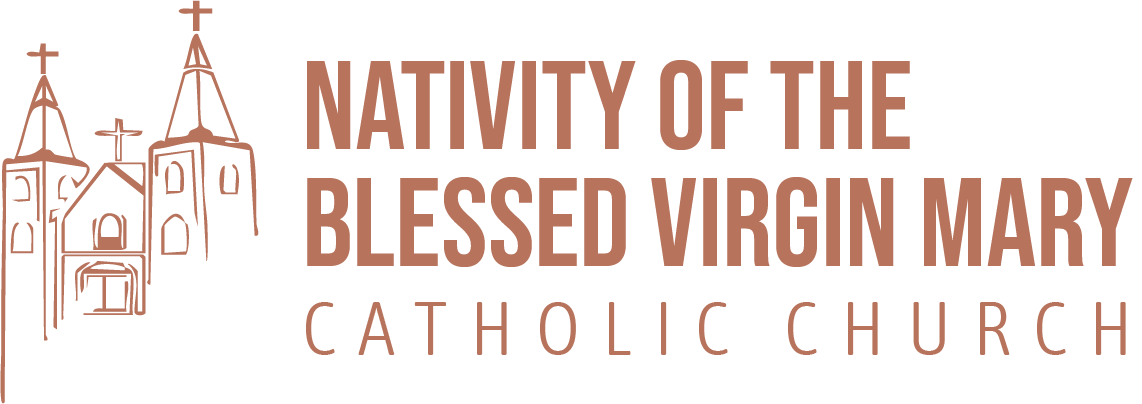Contact Information
For General Information:
Nicole Garcia
For specifics
Francesca Twiss
Nativity of the Blessed Virgin Mary Book Group
Here at Nativity we are blessed to have three different book groups. They are five week sessions that cover many topics. See below for previous books. The purpose of the group is not only to read, learn and discuss, but also to share our faith and our own journeys to God. They are a very relaxed environment that encourage open and respectful discussion. If you are interested in joining us, see the schedule below and give us a call, email us, or fill out the form below.
Upcoming Schedule- God
Wednesdays at 10am in the Pastoral Center
- 4/23/2025-Week 1- Chapters 1-4
- 4/30/2025-Week 2- Chapters 5-7
- 5/7/2025-Week 3- Chapters 8-10
- 5/14/2025-Week 4- Chapters 11-13
- 5/21/9/2025-Week 5- Chapters 14 & 15
The Seven Last Words of Jesus on the Cross

Continue Reflections on Foretold
Please Watch the seventh episode of Foretold
For even more in depth information, see the study guide below.
Week 5: triumph & reunion
Please Watch the fifth episode of Foretold
Think about the following questions to help guide you this Lent:
1. 1. Jesus had his eyes focused on doing the Father’s will. What is your one goal? Are you focused on it all the time? What helps you to stay focused? What distracts you from your goal? Is your end in any way connected with Jesus? Have you ever looked to him for help?
2. Reflect on “It is finished.” While Jesus never stopped trusting in God the Father, do you think that it is possible that Jesus worried whether his disciples were up to the task of carrying on his work? Peter had just denied him, and many others scattered. Do you think that there may have been a part of Jesus reflecting on the possibility that his teachings and disciples would not last? What would that have felt like to Jesus on the cross, especially amidst his physical and spiritual pain?
3. What does it take to accomplish one’s calling or task in life? Can you think of qualities necessary for a person to fulfill his or her calling in life? Of all the qualities on your list, which are the more important? Which do you need the most?
4. Do you believe that Jesus’ suffering and death continues to this day in the lives of the members of his body? If so, how do you envision this continuity? Is it real or simply metaphorical? How is your suffering a participation in that of Christ’s? Is there any way in which it is not?
5. Even though you were not alive at the time, do you consider yourself a witness to Jesus’ passion, death, and resurrection? If so, in what way? How do you give witness to it? How is this witness exemplified in your life? What more needs to be done? In what way is Jesus accomplishing his redemptive task in you? How are you passing his message on to others?
6. How do you react to silence? Does it make you feel uncomfortable, unsettled, or afraid? How do you react to periods of silence within prayer? Does it make you feel distracted, lonely, uncared for, abandoned? Have you learned how to listen to the silence within your heart? Have you learned how to interpret this silence?
7. Was Jesus free during his death—or limited? In what ways was he free? In what ways was he limited? Did Jesus liberate humanity by voluntarily limiting himself? Have you ever experienced something similar in your own life? Can you think of concrete examples from your life where this proved to be so?
8. How do you see the relationship between the love of God and the love of neighbor? Are they the same or separate? Does Jesus’ suffering and death on the cross or his resurrection tell you anything about the relationship between the two? What does God’s love for you tell you about your love for God? Does it tell you anything about your love for your neighbor? Should it?
9. How do you view the relationship between the Holy Spirit and your own spirit? Are they the same or completely distinct? Do they communicate in any way? Does Jesus’ death and resurrection have anything to do with your understanding of this relationship? How do you listen to the spirit in your life? Do you know when you are not listening? How can you tell the difference?
For even more in depth information, see the study guide below.
Week 4: Abandonment & Distress
Please Watch the fourth episode of Foretold
Think about the following questions to help guide you this Lent:
1. Have you ever felt isolated and alone by others? By God? If so, how did you cope with the situation? Did it last for a long time? Did it increase or diminish over time? Did you learn anything from the experience? Did you find it difficult to talk with others? Did you find it difficult to talk with God?
2. What dimensions of human suffering have visited you most frequently? The physical? The emotional? The mental? The social? The spiritual? Which do you find most difficult to deal with? Is there any combination of these that you have found particularly traumatic? How have you coped with it?
3. Are you able to question God? Can you ask him why things have happened and turned out the way they did? Does God invite such questions or discourage them? What can be gained from asking such questions? Why did Jesus ask such questions from the cross? Does such questioning draw one closer to God or further apart?
4. Why do you think Jesus used the psalms to call on God in his hour of need? Do you think he did so often? Was he able to pray them from the heart? How else could he have prayed them? Do you use the psalms in prayer? If so, is there any one in particular that you find particularly helpful? If not, would you be willing to try reflecting upon them? Do you think you can pray them from the heart?
5. What do you thirst for? Are there many things on your list? Or few? Where does your thirst for God fit in? Is it high up on the list? Near the bottom? Somewhere in the middle? What could you do to bring your thirst for God more to the forefront of your awareness?
6. Does your yearning and thirst for God come solely from you or does the Holy Spirit play a part in it? Have you ever experienced the spirit groaning within you? If so, who or what is it groaning for? Do you identify this groaning with spiritual thirst? If so, who or what is the spirit thirsting for? Do you think this thirst will ever go away? Should it?
7. In what sense does Jesus thirst for you? In what sense does he need you? What would it take to quench this thirst? In what sense is his thirst related to his desire to dwell within your heart? Is it somehow revealed to us in and through Jesus’ thirst from the cross?
For even more in depth information, see the study guide below.
Week 3: Relationship
Please watch the third episode of Foretold
Think about the following questions to help guide you this Lent:
1. How do think Jesus would have felt seeing his mother at the foot of the cross? What do you think he would have thought?
2. How are you most comfortable thinking of Mary, as Queen of Heaven, or as a wife and mother with household chores and duties to her family? Can you envision her the other way?
3. If you had been alive at the time, where would you have been on the day Jesus died? Would you have betrayed him? Would you have denied him? Would you have run away? Would you have watched him die from a distance? Would you have watched him from the foot of the cross? Can you identify with one or many of these reactions to Jesus’ suffering and death? Which is the most dominant?
4. What is your attitude toward the beloved disciple? Why did he have a special place in Jesus’ heart? What was it that set him apart from the other disciples? Can you see yourself in this role? Can you see yourself at the foot of the cross on the day Jesus died? Can you see yourself accepting Mary into your life and treating her as your mother?
5. What does it mean to receive Mary into your home? What does it mean to receive Mary into your heart? Have you done so? Why or why not?
6. In Jesus’ helplessness on the cross, one of his last acts was to care for someone-his mother. How do you think, even in your own helplessness, you can help others?
For even more in-depth information, please see the study guide below.
Week 2: salvation
Please watch the second episode of Foretold
Think about the following questions to help guide you this Lent:
- Is just avoiding sin enough?
- Do you live in mediocrity?
- What is your greatest fear? Do you know what it causes you to be afraid? Have you ever shared this fear with anyone else? Have you shared it with God? Do you share your fears with God, or do you try to keep them from him?
- How do you feel about death? Are you afraid of it? Do you ignore it? Do you think you will face death with confidence or with fear and uncertainty? What do you think life after death will be like?
- Do you think God has a personal interest in you? Do you think of God as your friend? Do you ever talk to God as a friend? Why or why not? Do you believe that God will be with you at the moment of your death?
- What is paradise for you and what is paradise for God? Is there a connection between the two? Can paradise for you and God begin before your death?
- What does it mean, then, that the Kingdom of God is in our midst?
For even more in-depth information, please see the study guide below.
Week 1: Forgiveness
Please watch the first episode of Foretold
Think about the following questions to help guide you this Lent:
- What is God’s Providence?
- How much of Christ’s crucifixion was due to ignorance? Was that an excuse or true ignorance? What does that then mean of Christ’s forgiveness of those that killed him?
- How often do we hurt others? Have we often thought how that effects not only them, but ourselves and our relationship with God? How often do we recognize the effect that we have on others?
- Do you lack human wisdom? How can you help foster human wisdom and not rely solely on human intellect?
- Do we prefer to remain blind to what we should know and how we should act, or do we actively seek God’s gift of wisdom?
- Are there people that you look at today that you see with only the lens of broken humanity, or do you see them in wisdom? Do you recognize Christ in them? Is it easier to look at those that you know and love with kindness than strangers? How can you look at all of humanity with different eyes?
- Have you ever found it difficult to forgive? Did you forgive that person? If not, can you forgive them now? What do you think you would need to forgive them? Do you find it difficult to receive forgiveness from others? Do you find it difficult to receive forgiveness from God? Do you find it difficult to forgive yourself?
- How does God’s Providence connect to the Crucifixion, forgiveness, and our own knowledge of our Faith?
For even more in-depth information, please see the study guide below.
To begin your Lenten journey, please watch How to Lent on Formed and answer the following questions:
Episode 1
What nonessentials are crowding out God in your life right now?
Where are you in your faith journey today, how would you describe it?
Episode 2
What commitment will you make to the Lord this Lent in regards to prayer?
What reason or motivation do you have in making this specific commitment to prayer?
Episode 3
What commitment will you make to the Lord in the area of fasting?
What is your motivation in choosing this specific action in the area of fasting?
Episode 4
What commitment will you make in the area of almsgiving?
What is your motivation for choosing to give alms in this manner?
You can buy your own Lenten book from the Augustine Institute here. You may also receive a free booklet here in the Faith Formation Office while supplies last.
Once Lent begins, if you are not able to join us for one of our book groups, please continue to stop by this page. It will be updated with weekly reflections so you can follow along with us during Lent.
If you are interested in joining us in person, please reserve your space below:
Book Group Registration
Previous Books
If you are interested in any of these books, feel free to stop by the Faith Formation Office for a free copy. You can also click on each title to order directly from the Augustine Institute. The link next to each title will take you to the study guide used for each book.
- The 7 Last Words of Jesus Study Guide PDF
- God: What Every Catholic Should Know By Elizabeth Klein Study Guide PDF (Thanks to D. Gutierrez on her hard work for this Study)
- True Meaning of Christmas By Michael Patrick Barber Study Guide PDF
- Being Catholic: What Every Catholic Should Know By Suzie Andres Study Guide PDF
- Jesus and the Jewish Roots of Mary By Brant Pitre Study Guide PDF
- Jesus and the Jewish Roots of the Eucharist By Brant Pitre Study Guide PDF



